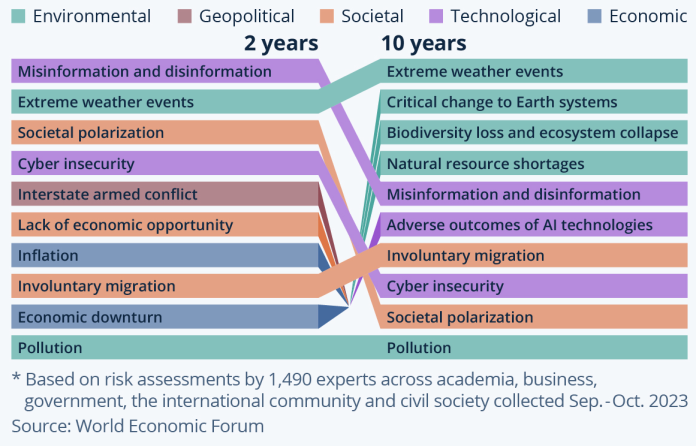Over the next ten years, climate change and its consequences will pose the greatest risk to the world.
That’s according to roughly 1,500 global experts from academia, business and politics, who were asked to evaluate 34 global risks over a two-year and a 10-year horizon for the World Economic Forum’s annual Global Risks Perception Survey.
With inflation easing in most parts of the world, the experts no longer consider the cost-of-living crisis the most pressing issue in the short-term. Instead, they think misinformation and disinformation will be the most severe risk over the next two years.
In the light of nearly three billion people heading to the electoral polls in various major economies during that time, the widespread use of mis- or disinformation could “undermine the legitimacy of newly elected governments” and ultimately result in unrest in the form of violent protests, hate crimes or even terrorism.
Elevated inflation, interest rates and high economic uncertainty contribute to palpable frustration, which in turn is the ideal breeding ground for misinformation to spread and further widen the cracks in society
Looking at the 10-year horizon, misinformation is expected to remain a major threat, but the four most severe risks faced by the world are all predicted to be related to climate change over the coming decade.
The illustrative chart nicely illustrates the difference between what experts consider short-term risks and which challenges will shape the world for years or even decades to come.
In conclusion, the 19th edition of the WEF’s Global Risks Report finds that “the world is plagued by a duo of dangerous crises: climate and conflict.
Underlying geopolitical tensions combined with the eruption of active hostilities in multiple regions is contributing to an unstable global order characterized by polarizing narratives, eroding trust, and insecurity.
At the same time, countries are grappling with the impacts of record-breaking extreme weather, as climate-change adaptation efforts and resources fall short of the type, scale and intensity of climate-related events already taking place.”
Elevated inflation, interest rates and high economic uncertainty contribute to “palpable frustration at the status quo”, which in turn is the ideal breeding ground for misinformation to spread and further widen the cracks in society.
Source: Statista


